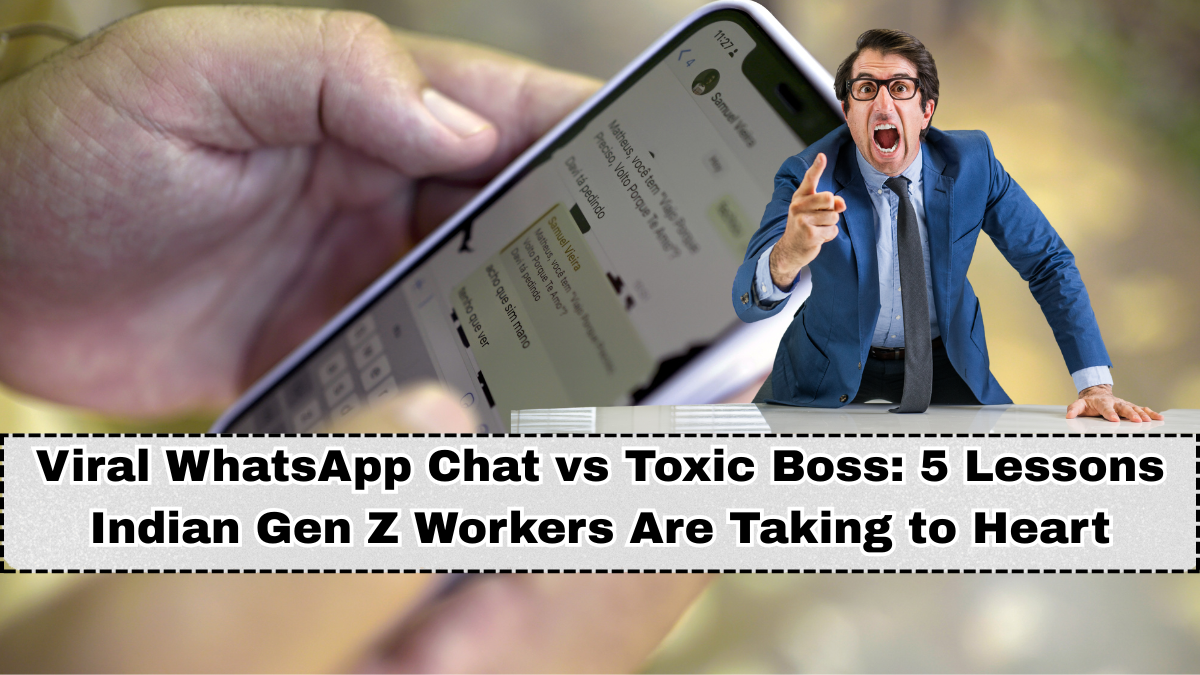A simple WhatsApp screenshot has blown up across Instagram and X in India. In the viral exchange, a young Gen Z employee calmly but firmly confronted a toxic boss who demanded after-hours work, sent rude voice notes, and threatened consequences for not replying immediately. The bold, polite and boundary-setting response captured the attention of millions. Suddenly, Indian workplaces are discussing respect, burnout, and employee rights with fresh urgency. The Viral WhatsApp Gen Z vs toxic boss moment has become more than gossip—it’s a mirror to shifting workplace culture in 2025.
Gen Z workers are rewriting office rules across India. They won’t tolerate disrespect, unclear job roles, or manipulative behaviour disguised as “dedication.” They value work-life balance, mental well-being, and fair treatment. This is in contrast to older workplace cultures where employees often stayed silent, tolerated toxic remarks, or worked overtime without questioning. The viral chat has triggered a nationwide conversation about where to draw boundaries, when to stand up, and how Indian companies must evolve if they want to retain young talent.

Why This WhatsApp Chat Went So Viral in India
The screenshot struck a nerve because millions of employees have had similar interactions. Many recognised the boss’s passive-aggressive tone, unrealistic expectations, and guilt-driven messaging. The employee’s calm response—assertive yet respectful—felt refreshing. For the first time, a young worker responded in a balanced manner instead of reacting emotionally or staying silent. It showed that confidence doesn’t have to be rude, and professionalism doesn’t mean blind obedience.
Social media users praised the employee for being factual, boundary-driven and emotionally mature. Others shared their own workplace stories, highlighting how common toxic leadership still is. The Viral WhatsApp Gen Z vs toxic boss discussion ultimately became a learning moment for both employees and employers.
Lesson 1: Boundaries Are Not Disrespect
Older generations often equated boundaries with arrogance. But today, boundaries are essential for mental health. Saying “I will respond during work hours” is not disrespect—it’s clarity. Gen Z workers understand that without boundaries:
• workload expands endlessly
• stress becomes chronic
• burnout hits early
• resentment destroys motivation
In the viral chat, the employee simply stated availability times and stuck to them. This calm firmness is a skill every professional should learn.
Lesson 2: Indian Employees Must Know Their Rights
Most Indian employees still don’t understand basic labour rights, including:
• no obligation to respond after official hours
• paid overtime rules
• protection against harassment
• written job role clarity
• leave and notice period guidelines
A major takeaway from the incident is how confidently the employee asserted these rights. When workers know the law, manipulation loses power. The growing trend of workers Googling their rights before replying is reshaping modern workplaces.
Lesson 3: Toxic Bosses Often Use Emotional Pressure, Not Logic
The viral conversation revealed classic toxic boss tactics:
• implying employees “lack dedication”
• exaggerating urgency
• demanding instant replies
• criticizing tone instead of addressing issues
• using guilt to enforce compliance
These behaviours create an unhealthy work environment. Gen Z is quicker to recognise such patterns, and they respond with logic rather than fear. They refuse to be emotionally manipulated—an important shift in Indian professional culture.
Lesson 4: Calm Communication Is More Powerful Than Aggression
The biggest lesson from the chat was communication style. Instead of yelling, ghosting, or sending angry messages, the employee responded:
• politely
• factually
• with boundaries
• without emotional triggers
This approach is effective because it exposes the unprofessional behaviour without creating unnecessary conflict. Calm communication disarms toxic authority and shows professionalism and self-respect. It also protects the employee from HR backlash, since every message is polite and documented.
Lesson 5: Respect Must Flow Both Ways
The viral trend showed India a simple truth: respect is not one-sided. Young employees expect managers to:
• communicate professionally
• give notice for urgent tasks
• acknowledge personal time
• avoid insults or unrealistic deadlines
• value mental health
Companies that refuse to adapt face higher attrition rates. Many Gen Z workers now choose jobs based on culture, not just salary. Respect is becoming a non-negotiable career criterion.
How Indian Workplaces Are Changing After This Viral Moment
Workplaces in 2025 are gradually shifting:
• HR teams are conducting sensitivity workshops
• employees are documenting conversations more carefully
• companies are introducing after-hours communication policies
• managers are being trained in modern leadership styles
• hybrid and flexible work cultures are rising
The viral chat has pushed organisations to introspect. Employees now feel more empowered to call out unfair treatment.
How Employees Can Use These Lessons in Their Own Jobs
To stand up for yourself without conflict:
• define clear work hours
• document all important interactions
• avoid emotional replies
• communicate respectfully
• know your rights
• set boundaries early, not after burnout
• stay consistent
These strategies protect both your mental health and your career.
FAQs
Why did this WhatsApp chat go viral?
Because millions of Indian workers have faced similar toxic behaviour, and the employee’s calm boundary-setting response felt relatable and empowering.
How can employees deal with a toxic boss?
By setting clear boundaries, documenting communication, staying respectful, and knowing workplace rights.
Is it okay to refuse after-hours work?
Yes, unless it is part of your formal job contract or compensated. Employees are not legally obligated to respond 24/7.
Why is Gen Z more vocal about toxic workplaces?
They prioritise mental health, balance, and respect, and they don’t fear switching jobs if the environment is unhealthy.
Can companies take action against toxic bosses?
Yes, through HR escalation, behaviour training, code-of-conduct enforcement and mental-wellbeing policies.
Click here to know more.
